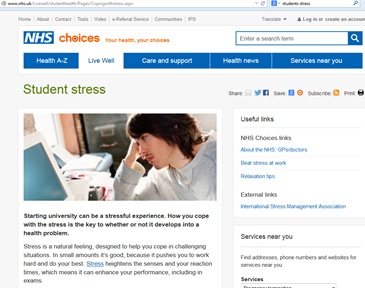Assessing websites
Anyone can publish on the internet. This means that, although there is a lot of reliable information, there is also a lot of unreliable information out there. Often, there has been no quality control by editors or peers. You should therefore be extra critical when dealing with information you have taken from the internet (see Choosing information sources).
On the internet, commercial interests may play a role. You should therefore always pay close attention to the independent status of websites.
Relevance
Correspondence with question and objective |
|
| Completeness |
|
| Topicality |
At Nice to know: Topicality of websites you will find a useful tip to check when a site was last updated. |
Reliability
| Authority |
|
| Correctness |
|
| Objectivity |
|
| Quality of the website |
|
| Verifiability |
|
Examples [voorbeelden vervangen]

Example 1:
You are writing an article about headaches. You have found this website using Google: http://www.thedailyheadache.com
Relevance
- This site contains various blogposts of someone who suffers from chronic headaches. Purpose of the website is to inform about headache disorders, chronic migraine, chronic illness & depression and to offer coping strategies, resources and news.
- Topicality: reference is made relevant sites. It looks like the information is up-to-date.
Reliability
- The author’s aim with this personal website is to share information and exchange experiences through the forum.
- The author is expert by experience. She also posts on migraine.com
- The website lacks credits. It is not clear who is behind the website, although the author states her name.
- The content of the website seems to be rather biased. Many of the articles discuss alternative treatments.
- The sources for the articles are cited. The website does however looks rather amateurish.
Conclusion
This would be a good source if your aim is to learn about someone’s personal experiences. To find recent, complete and objective information it would be better to choose another source.
Example 2:

You are writing an article about stress among students.
You have found this site while searching:
http://www.nhs.uk/Livewell/studenthealth/Pages/Copingwithstress.aspx
Relevance
- The site is an introduction to the topic, probably only giving partially answer your questions.
- Although the website contains relevant information, it would be useful to also consult other sources. This will give you a more complete picture of the topic.
Reliability
- According to the About us section The website NHS Choices (www.nhs.uk) is the UK’s biggest health website. It aims to provide a comprehensive health information service to help people to make choices about health and lifestyle.
- The about us section shows all information on the background and structure of this website.
- The author regrettably does not mention any sources, but you may assume that the information an organisation as the NHS provides, is correct.
- The website looks very professional. The systematic introduction allows you to find information quickly. There are also references to other relevant, reliable sources.
Conclusion:
This is a useful site made by somebody with sufficient knowledge. The links to other sites are a useful additional resource when searching for further information.
